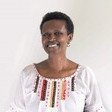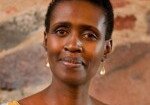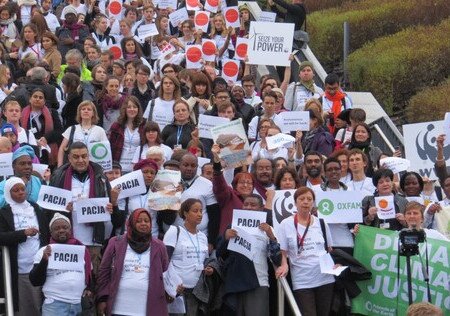Winnie Byanyima

Winnie Byanyima is Executive Director of Oxfam International. She is a leader on women’s rights, democratic governance and peace building.
Advocacy and Campaign25 NOV 2016
Winnie Byanyima
‘Enough’, they said.
I recall how my mother, a community leader, started and led women’s clubs in my village. Women in my village organised and stood together for their rights and those of their daughters.
Advocacy and Campaign19 JAN 2016
Yet again I am attending the World Economic Forum in Davos, warning about the global inequality crisis – and proposing steps to tackle it. Yet again, Oxfam has released shocking new statistics which illustrate how severe this crisis has become: 62 people now have the same wealth as the poorest half of the planet – that’s 3.6 billion people.
I am not the only one raising the alarm: Consistently now, we hear concern on inequality from voices such as President Obama, the Pope, Christine Lagarde of the IMF, and people on the street. And things are starting to change. But not enough.
It’s not enough because the gap between the rich and poor has grown dramatically in the past 12 months. This time last year 80 people owned the same amount as the poorest half of the planet and Oxfam was predicting the wealth of richest one percent would overtake the rest of us by 2016 – this particular milestone was passed ahead of schedule in October.
The consequences of such rapidly growing and extreme inequality are huge. Economic inequality can act as brake on growth, slow poverty reduction efforts, and spark social unrest. Oxfam sees the devastating impact of extreme inequality in many of the countries where we work – from the school children of South Africa whose education is suffering because of lack of government funding, to the garment workers of Myanmar who work long exhausting hours for global suppliers but who can’t cover their rent and feed their families on what they earn.
Advocacy and Campaign30 NOV 2015
As I arrive in Paris, I will be remembering the faces of the women in the village where I grew up in Uganda. They rely on the land, herding cows, and growing crops – and they are amongst the 3.5 billion poorest people around the world whose daily lives are perilously exposed to changes in the climate.
Climate change is a fundamental environmental, economic, humanitarian and security threat to our world. It isn’t “another crisis” we can somehow chose to prioritize above or below others. Within Oxfam, we also see it as a crisis of inequality, where poor and vulnerable people – and especially the women of the South – are shouldering hugely disproportionate risks.
The UN climate talks in Paris next month will likely result in a global deal. The big question is what will the deal look like – and will it benefit the elites and the big emitters only, or the most vulnerable too?
I’m optimistic that humankind has the technical and political capabilities to run a cleaner, more stable and safer world, one that can deliver on the ambitious new Sustainable Development Goals. Countries can find the money, as they did $11 trillion to bail out the banks.
Advocacy and Campaign22 NOV 2013
By Winnie Byanyima – Executive Director at Oxfam International
Today, I led hundreds of people from around the world in a walk out of the 19th UN climate talks. Oxfam has been keenly involved in the talks for a long time, fighting to help stop climate change, and to support people affected by it, and every day the urgency for governments to help gets greater. But year after year, the talks have been mostly just going through the motions – with very little progress on reducing emissions, or on raising the $100bn governments have promised to support people affected by climate change by 2020.
We have campaigned passionately and powerfully. Yet the public’s shouts of urgency for governments to act seem to be falling on deaf ears. This year, the talks have reached new lows: The hosting Polish government has colluded with the coal industry to present “clean coal” as a solution to climate change (it isn’t a solution). Australia has attacked the very principle of climate finance. Japan has even pledged to increase – not reduce – their emissions!





